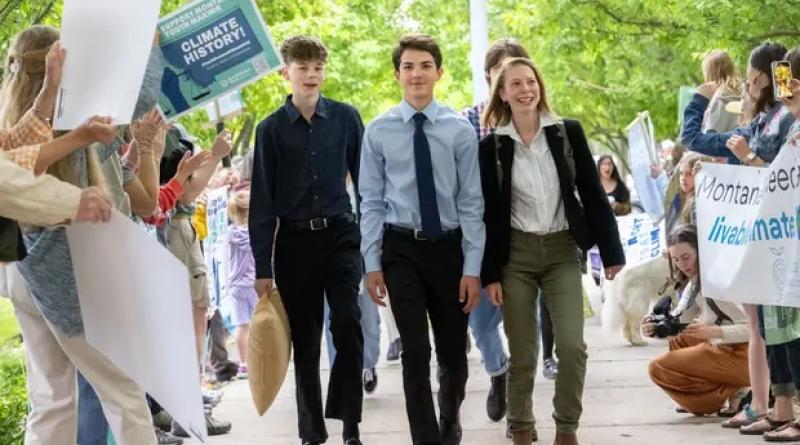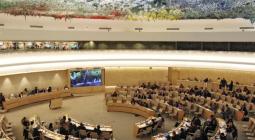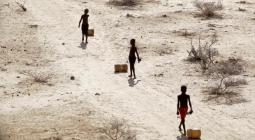‘I’m a prisoner in my own home,’ asthma sufferer, 15, tells landmark US climate trial

Mica, aged 15, learned about climate change at the young age of four, when his parents showed him the documentary Chasing Ice.
“I understood it more than my parents thought I would,” he testified in a groundbreaking trial on Tuesday. “I just knew something bad was happening, but I didn’t know exactly what it was.”
Mica came home from the film crying, he recalled. His parents helped him send a letter about the climate crisis to Senator Jon Tester, a rare Democrat in office in Mica’s home state of Montana. But Tester’s office merely sent an automated response.
Since then, Mica told the first judicial district court of Montana, he has learned more about climate change in school and by reading scientific articles, and has become involved in advocacy to combat it. He has also seen its effects first-hand.
Mica is one of the 16 youth plaintiffs in the 2020 lawsuit Held v Montana, which is being heard in the state capital, Helena, this week. The challengers allege that state officials have violated their constitutional rights to a healthy environment. The trial, which began on Monday, marks the first ever constitutional climate trial in US history.
A lover of the outdoors, Mica, who lives in Missoula, Montana, said he was frequently bothered by smoke from wildfires. This makes it hard to go for runs, something the young plaintiff has enjoyed since he was five.
When he can’t train due to the smoke, Mica said, he feels “trapped”.
“I can’t get my mind off things,” he said.
In 2020, Mica contracted Covid and was forced to isolate from his family in his basement. Because of the intensely hazy conditions, he could not go outside.
“I’m a prisoner in my own home,” Mica, who this spring was diagnosed with asthma, wrote in a poem at the time, which he read on the stand.
In the future, Montana’s wildfires will only get worse as heat and dry conditions become more common, according to Earth scientist Cathy Whitlock, a professor emerita of Earth sciences at Montana State University who served as an expert witness for the plaintiffs earlier in the day.
Whitlock, who led Montana’s 2017 climate assessment and has co-authored several other climate reports for the state, explained that Montana’s average temperatures (according to Noaa data) have risen by an average of 0.2F (0.1C) each decade since 1900. Since 1970, the rise has been even more drastic, at 0.53F (0.29C) every decade.
“And the rate is increasing,” she said.
All that warming, Whitlock said, fuels not only wildfires – which spark more easily in hot, dry conditions – but also drought, snowpack loss and extreme heat.
These trends are only expected to become more dramatic as the climate crisis progresses.
“The plaintiffs by the end of the century are going to be experiencing much warmer conditions than now,” Whitlock said.
Tensions ran high as Whitlock was cross-examined by Thane Johnson, an attorney representing the state.
The court case specifically alleges that part of the Montana Environmental Policy Act, which prevents the state from considering how its energy economy may contribute to climate change, runs counter to the state’s constitutional requirements to provide a “clean and healthful” environment.
Johnson asked Whitlock about the state’s non-energy sources of emissions, such as agriculture, which would not be affected if the Montana Environmental Policy Act was overturned. Further, he asked if Montana could tackle the climate crisis on its own.
Whitlock agreed that every sector in Montana must cut its emissions, and that the climate crisis is a global problem. But slashing planet-warming pollution from the energy sector, she said, would help secure a livable future.
“All areas have to do their part,” she said.
In an interview outside the courtroom, Barbara Chilcott, a senior attorney at the Western Environmental Law Center who is representing the plaintiffs, echoed that sentiment.
“As most people know who work in this space, every ton of carbon matters and that’s no different in Montana,” she said.
Johnson became visibly agitated while cross-examining Whitlock, earning him an admonishment from the judge.
“You need to settle down just a little bit, Mr Johnson,” Judge Kathy Seeley said.
Next week, the court is expected to hear from the defense’s expert witnesses, including climate crisis-denying climatologist Judith Curry.
Curry, a former Georgia Tech professor who is frequently invited by Republicans to testify at congressional hearings, was in 2010 called “a new breed of climate change contrarian – the delayer” by esteemed climatologist Michael Mann. Her private weather forecasting company counts utilities and oil companies among its clients, and the state has paid her tens of thousands of dollars for her time, climate website DeSmog reported.
In Tuesday’s testimony, Whitlock rebutted an expert report that Curry submitted to the court, explaining that methodologies she employed for the research were flawed. The data Curry used, she said, was “cherry-picked”.
Curry’s report concluded that climate change has not altered precipitation in Montana, but that assertion, Whitlock said, did not account for the fact that the state’s spring and fall seasons have gotten wetter and its summers have gotten drier.
“That’s like evaluating health based on the total number of calories taken in in a year,” she said. “It matters when you take in calories and where those calories come from.”
Veteran ecologist Daniel Fagre, who for three decades worked at the US Geological Survey, was also called by the plaintiffs’ team to testify on Tuesday.
The glaciers in north-western Montana’s Glacier national park, he said, “will disappear under current likely emission scenarios due to the
climate crisis”.
He went on to contest assertions that Curry made in her expert report about glacial melt, saying she relied on flawed methods.
The state’s glaciers are crucial for water systems, Fagre said, and have also inspired Montanans for decades.
Later in the afternoon, Badge, a 15-year-old plaintiff from Kalispell, Montana, testified about his love for Montana’s renowned natural beauty.
“I wouldn’t choose to live anywhere else,” he said.
But Badge, an avid hunter, fisher and hiker, said he’s witnessed those iconic landscapes change over his lifetime. He was named after the Badger-Two Medicine, a swath of lush protected land adjacent to Glacier national park which in 2015 was scorched by wildfires. He saw the damage first-hand on a trip to the area with his father.
“Being with my namesake, it’s saddening,” he said, tearing up.
Physician Lori Byron testified last on Tuesday, saying children are especially vulnerable to the physical and mental health effects of the climate crisis.
“Children’s health is already being harmed,” she said.
On Wednesday, Byron is expected to continue her testimony, which will include a rebuttal of Curry’s report.
Despite their anxiety, both Mica and Badge said participating in the Held v Montana case has empowered them.
“I want to preserve this beautiful land for myself and future generations,” Badge testified.
Chilcott said she was moved by the young plaintiffs’ optimism.
“I hope that their hope will be met,” she said, “and that we will continue to make progress in mitigating climate change for them.”
cover photo:Plaintiffs arrive for the second day of the trial in Helena, Montana – the the first ever constitutional climate trial in US history. Photograph: Robin Loznak/Zuma/Shutterstock






